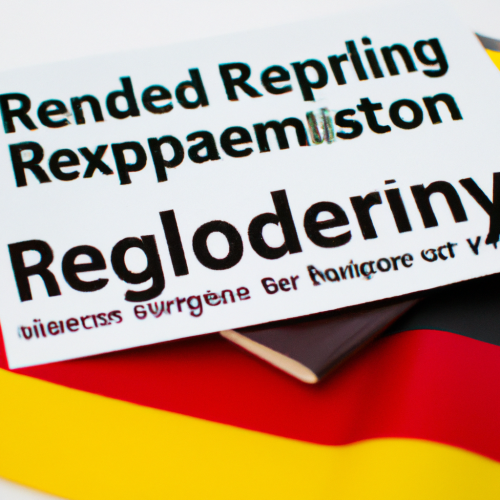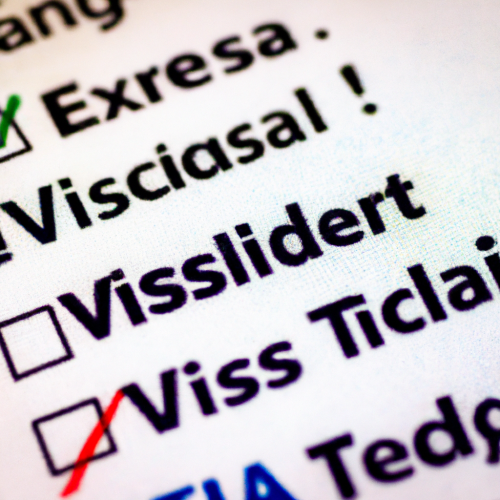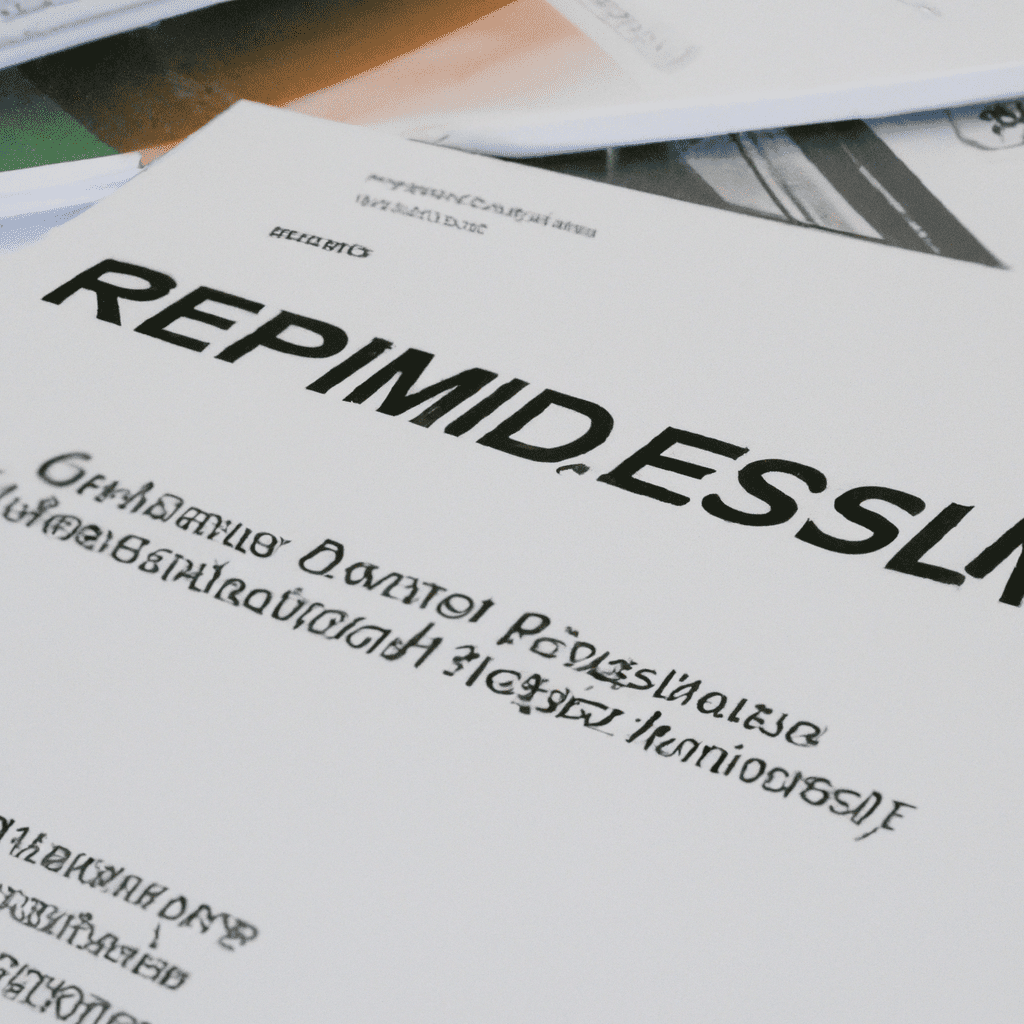The residency process in Germany can be a complex and daunting task for foreigners looking to make the country their new home. With numerous bureaucratic procedures and various legal requirements, understanding the ins and outs of this process is crucial. In this comprehensive guide, we aim to provide a step-by-step breakdown of the residency application process in Germany, addressing everything from necessary documents and visa types to registration requirements and integration courses. Whether you are a student, a job seeker, or simply seeking to settle in Germany for personal reasons, this article will serve as an informative resource to help navigate the residency process smoothly and efficiently.
Residency Process in Germany: A Comprehensive Guide
Overview
Germany is known for its high quality of life, strong economy, and excellent education system, making it an attractive destination for individuals seeking to pursue residency in the country. However, navigating the residency process can be complex and require careful planning and documentation. This comprehensive guide aims to provide you with a step-by-step breakdown of the residency process in Germany, ensuring that you are well-prepared to fulfill all the necessary requirements.
Initial Steps
Before diving into the residency process, it is crucial to have a clear understanding of the purpose of your stay in Germany. Whether you’re considering a work-related residency, studying at a German educational institution, or simply relocating for personal reasons, each category requires specific documentation and procedures. Researching and identifying the appropriate visa or permit that aligns with your intentions is an essential initial step.
Once you have determined the purpose of your stay and the correct visa category, you should gather all the required documents for your application. These typically include a valid passport, proof of health insurance, proof of financial means, and, depending on your circumstances, additional documentation such as employment contracts, acceptance letters, or marriage certificates. Ensure that all documents are properly authenticated and translated into German if necessary. Applying for a visa can be done at the German embassy or consulate in your home country.
Residence Registration
Upon arriving in Germany, it is mandatory for all residents, including foreigners, to register their address at the local registration office (Einwohnermeldeamt) within a specified time frame. This process, known as Anmeldung, involves completing a registration form, presenting your valid passport, and providing a rental contract or confirmation from your landlord. Once registered, you will receive a registration certificate (Meldebescheinigung) that serves as proof of your residence in Germany. Keep in mind that failure to register within the required time period may result in penalties or legal consequences.
After completing the registration process, you will need to apply for a residence permit (Aufenthaltstitel) at the local immigration office (Ausländerbehörde). This permit grants you the legal right to reside and work in Germany, subject to the conditions specified in your visa category. It is crucial to apply for your residence permit well before the expiration of your visa to avoid any potential complications. Make sure to bring all required documents, including your passport, proof of registration, biometric photos, and any additional documents specific to your visa category.
Overview of the German Residency Process
Obtaining residency in Germany can be a complex but rewarding process for those wishing to live and work in this vibrant European country. This overview will guide you through the key steps involved in acquiring German residency, providing you with a solid understanding of what to expect.
1. Visa Application: The first step is to apply for a German visa. Depending on your purpose of stay, you may need to submit different types of visas, such as a work visa, study visa, or family reunion visa. It is essential to carefully review the specific requirements and gather all necessary documentation before submitting your application to the German embassy or consulate in your home country.
2. Arrival in Germany: Once your visa application is approved, you will be issued a visa that allows you to enter Germany. Upon arrival, it is mandatory to register your address at the local residence registration office (Einwohnermeldeamt) within a certain timeframe. This process is known as the Anmeldung, and it is crucial to complete this step as it is a legal requirement for all residents in Germany.
3. Residence Permit Application: After registering your address, you will need to apply for a residence permit at the Foreigners’ Registration Office (Ausländerbehörde) in the city or region where you will be residing. This permit typically replaces your visa and allows you to stay in Germany for a more extended period. The requirements for obtaining a residence permit will depend on the purpose of your stay, and you will need to provide proof of health insurance, valid travel documents, financial stability, and other supporting documents as per the specific category.
4. Integration and Language Requirements: As part of the residency process, there may be integration and language requirements that you need to fulfill, depending on your circumstances. These requirements can include attending language courses, participating in integration courses, and passing specific exams. It is essential to familiarize yourself with these requirements and fulfill them within the specified timeframe to ensure a smooth residency process in Germany.
While the German residency process may seem challenging, it is a journey that leads to exciting opportunities and a great quality of life in one of Europe’s most prominent countries. The information provided in this overview should give you a solid foundation to navigate the various steps involved, but it is always advisable to consult with the relevant authorities, such as the German embassy or consulate, to ensure you have the most up-to-date and accurate information for your specific situation.

Finding the Right Visa: Types and Requirements
When it comes to traveling or relocating abroad, understanding the various types of visas and their requirements is essential. Navigating the world of visas can sometimes feel overwhelming, but fear not! We’re here to help simplify the process and provide you with the information you need to find the right visa for your specific situation.
1. Tourist Visa
If you’re planning a short trip or vacation to explore a different country, a tourist visa is what you’ll typically need. This visa allows you to stay in the destination for a limited period, usually for leisure, sightseeing, or visiting friends and family. The requirements for a tourist visa may vary depending on your nationality and the country you intend to visit. It’s crucial to check with the immigration authorities or embassy for specific documentation, such as a valid passport, return tickets, or proof of accommodation.
2. Work Visa
Dreaming of venturing abroad to kickstart your career? A work visa is essential if you plan on seeking employment in a foreign country. Work visas are usually granted based on a specific job offer from an employer, and they come with certain conditions and limitations. Requirements for work visas often include a valid job offer, educational qualifications, proof of work experience, and sometimes even sponsorship from the employer. It’s crucial to familiarize yourself with the regulations of the country you’re interested in, as they might have specific procedures and quotas in place.
3. Student Visa
If you’re considering pursuing higher education in another country, a student visa is your gateway to fulfilling this dream. This type of visa allows you to study full-time for a predetermined period, whether it’s a degree, diploma, or short course. Student visa requirements typically include receiving an acceptance letter from an accredited educational institution, demonstrating sufficient funds to cover your tuition fees and living expenses, and providing proof of medical insurance. Additionally, you might need to meet specific language and academic requirements, depending on your chosen program.
Remember, each country has its visa regulations, and it’s crucial to research and meet all the requirements to ensure a smooth application process. By understanding the different types of visas available and their respective requirements, you’ll be well-prepared to embark on your international journey with peace of mind.
Understanding Registration and Anmeldung
When you first move to a new city or country, one of the most important things on your to-do list is registration. In Germany, this process is called Anmeldung, and it is mandatory for anyone who plans to stay in the country for longer than three months. Anmeldung is the official registration of your residence address, and it is necessary for a variety of important administrative and legal purposes.
Here are a few key points to help you understand the Anmeldung process:
- Residence Registration: Anmeldung involves registering your place of residence with the local authorities. You need to visit the local registration office known as Einwohnermeldeamt or Bürgeramt to complete the process. Make sure to bring all required documents, including a valid passport, rental agreement or proof of address, and a completed registration form.
- Benefits of Anmeldung: Anmeldung provides you with a wide range of benefits and rights. It serves as proof of your legal residency in Germany and is required for opening a bank account, applying for a visa or residence permit, enrolling in healthcare, and registering for various services such as electricity, internet, and telephone connections.
- Deadlines and Fines: Anmeldung should be completed within two weeks of moving into your new address. Failure to register or not registering on time may result in fines or legal consequences. It’s crucial to prioritize this process and ensure compliance with the local registration requirements.
Understanding the registration and Anmeldung process is essential for a smooth transition into your new life in Germany. By complying with the registration requirements, you’ll have peace of mind knowing that you have fulfilled your legal obligations and gained access to a host of important services in your new city.
Navigating Health Insurance in Germany
Understanding the intricacies of health insurance can be overwhelming, especially when in a foreign country like Germany. To ensure you make the most of your healthcare experience, we’ve compiled some key information and tips to help you navigate the German health insurance system.
The Basics of Health Insurance
In Germany, health insurance is mandatory for all residents. There are two types of health insurance available: statutory health insurance (gesetzliche Krankenversicherung) and private health insurance (private Krankenversicherung). Statutory health insurance is the most common option and covers the majority of the population, while private health insurance is typically chosen by self-employed individuals and higher-income earners.
Choosing the Right Insurance Provider
When selecting a health insurance provider, consider factors such as coverage, cost, customer service, and reputation. It’s advisable to compare different providers to find the one that best suits your needs. Additionally, pay attention to the waiting periods for certain medical services, as they may vary among insurers.
Understanding Insurance Coverage
The German health insurance system provides comprehensive coverage for a wide range of medical services. This includes doctor visits, hospital stays, prescription medication, preventive care, and specialist treatments. However, it’s important to understand that certain services, such as dental care or alternative treatments, may have limited coverage or require additional insurance.
- Tips for Hassle-Free Insurance:
- Carefully review your insurance policy to understand what is covered and any limitations.
- Keep all medical receipts and invoices for reimbursement purposes.
- Choose healthcare providers within the network of your insurance company to avoid excessive costs.
- Notify your insurance provider promptly about any changes in personal details or circumstances.
Work Permits and Employment Opportunities for Expats
Are you considering working abroad as an expat? One of the first things you’ll need to navigate is the process of obtaining a work permit. Each country has its own set of rules and regulations, so it’s crucial to research and understand the requirements before moving forward. Work permits are typically issued by the host country’s government and grant expats the legal right to work.
The availability of employment opportunities for expats varies greatly depending on the country and industry. While some countries may have strict limitations on hiring foreigners, others actively encourage expat workers to fill skill gaps and contribute to their economies. This means that with the right qualifications and experience, you can find exciting job prospects in diverse fields such as technology, finance, healthcare, teaching, and more.
It’s important to note that work permits often come with certain conditions. These conditions may include limits on the duration of your stay, restrictions on changing employers, or obligations to provide proof of employment. Additionally, some countries require expats to secure a job offer before applying for a work permit, while others allow individuals to apply for a permit upfront and then search for employment upon arrival.
Before making any decisions, consider consulting with an immigration lawyer or an expat network in your target country to ensure you’re well-informed and compliant with the regulations. Having a comprehensive understanding of work permits and the employment landscape for expats will empower you to make confident choices and embark on a successful international career.
Tips for a Smooth Transition to Permanent Residency
Transitioning to permanent residency can be an exciting yet daunting process. To ensure a smooth journey, here are some valuable tips to keep in mind:
1. Familiarize Yourself with the Immigration Laws: Understanding the immigration laws of your new country is crucial. Take the time to research and grasp the requirements, eligibility criteria, and application process. This will help you navigate the process smoothly and avoid any unnecessary hiccups.
2. Gather Necessary Documentation: Compile all the necessary documents well in advance. This typically includes identification proof, educational and professional qualifications, financial records, medical certificates, and any references required. Keep them organized and readily accessible, as having a complete set of documentation will streamline the application process.
3. Seek Professional Guidance: Engaging the services of an immigration lawyer or consultant can prove invaluable. They have the expertise to guide you through each step, from application submission to interview preparation, ultimately easing your transition. Their knowledge of the immigration system will ensure you comply with all regulations and procedures.
4. Plan for Financial Stability: Managing your finances is critical for a successful transition. Create a financial plan that takes into account not just the application fees, but also the cost of living and potentially unexpected expenses. Having sufficient savings will provide stability during the transition period and allow you to focus on settling into your new country.
By following these tips, you can enhance your chances of a smooth and hassle-free transition to permanent residency. Remember, being well-prepared and informed will go a long way in making this significant milestone in your life a positive experience.
Future Outlook
In conclusion, the residency process in Germany is a comprehensive and well-structured system with clear guidelines and requirements. While it may seem complex at first, understanding the various steps involved can make the process smoother and more manageable.
This comprehensive guide has aimed to provide you with a detailed overview of the residency process in Germany, offering valuable insights into the necessary documents, application procedures, and key considerations. From obtaining a visa, securing health insurance, to registering your address, each aspect has been carefully addressed to guide you through the process.
It is crucial to note that the residency process may vary depending on your individual circumstances, such as your country of origin, purpose of stay, and the specific German state you intend to reside in. Thus, it is advisable to visit the respective authorities’ websites for the most up-to-date and accurate information based on your specific situation.
Remember, patience and thorough preparation are key when embarking on your journey towards obtaining residency in Germany. Familiarize yourself with the requirements, collect all the necessary documents, and be proactive in seeking assistance from the appropriate authorities. Additionally, seeking guidance from relocation services, legal experts, or expat networks can further support you in navigating this process.
Germany offers a plethora of opportunities, both professional and personal, for individuals from all walks of life. Its efficient and well-organized residency process ensures that individuals can benefit from everything the country has to offer. By following the guidelines outlined in this comprehensive guide, you are one step closer to successfully becoming a resident of Germany.
We hope that this article has served as a valuable resource, equipping you with the information needed to understand and navigate the residency process in Germany. So, embrace this exciting journey and take the necessary steps towards making Germany your new home. Good luck!





